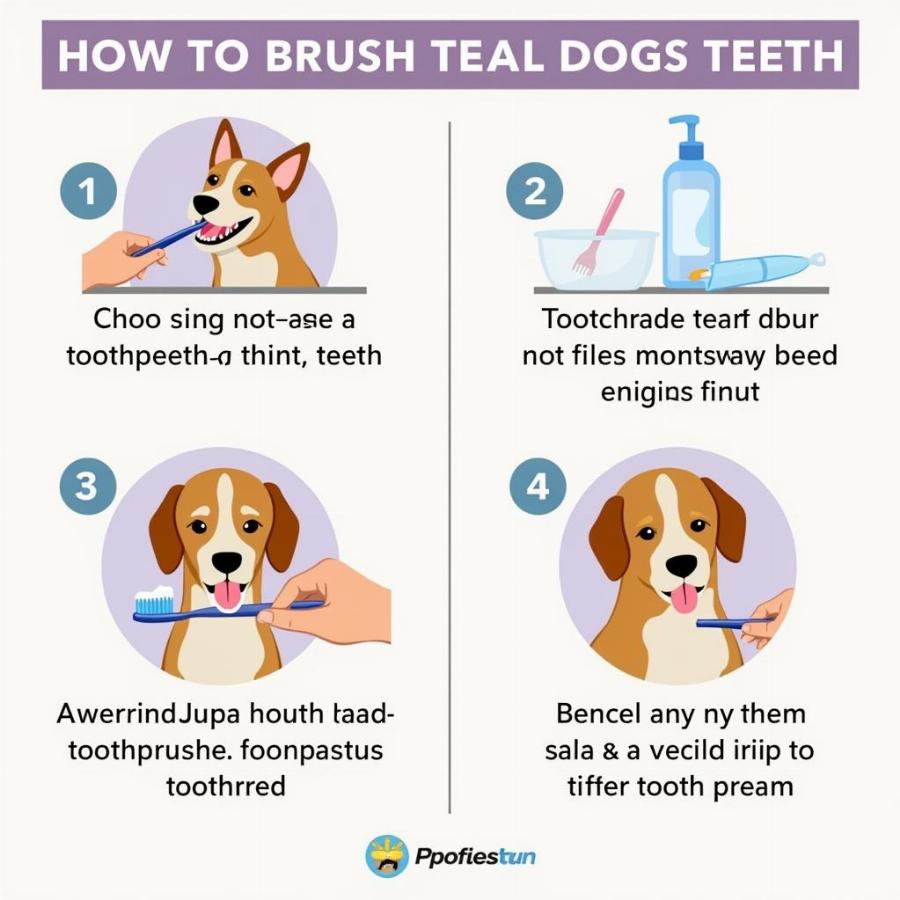The age-old question, “are dog’s mouths cleaner?” often sparks debate. While the idea of a dog’s saliva having healing properties is a myth, understanding canine oral hygiene is crucial for responsible pet ownership. This article delves into the complexities of a dog’s mouth, separating fact from fiction and providing practical advice for maintaining your furry friend’s oral health.
Dog Mouths vs. Human Mouths: A Comparative Look
Comparing dog mouths to human mouths isn’t a straightforward apples-to-apples comparison. Both contain unique bacteria, with some potentially harmful to the other. While a dog’s mouth may not be “cleaner” in the traditional sense, it houses a different ecosystem than a human’s. Thinking about “cleanliness” in this context requires understanding bacterial diversity rather than making broad generalizations.
Factors Influencing a Dog’s Oral Health
Several factors influence a dog’s oral health. Diet plays a significant role, with certain foods contributing to plaque and tartar buildup. Chew toys, designed to promote dental health, can also have varying degrees of effectiveness. Genetics, age, and breed also influence a dog’s predisposition to dental issues.
Debunking the Myth of Healing Dog Saliva
The notion that dog saliva possesses healing properties is a pervasive misconception. While a dog licking a wound might offer some superficial cleaning, it can also introduce harmful bacteria, potentially leading to infection. Proper wound care requires antiseptic solutions and veterinary attention, not reliance on canine saliva. is a dog mouth cleaner than a human mouth
Is a dog’s lick truly beneficial?
No, a dog’s lick, while instinctual and sometimes comforting, isn’t a substitute for proper hygiene.
Can dog saliva cure infections?
Absolutely not. Dog saliva can introduce more bacteria, potentially exacerbating infections.
Practical Tips for Maintaining Your Dog’s Oral Hygiene
Maintaining your dog’s oral hygiene involves a proactive approach. Regular brushing with dog-specific toothpaste is crucial. Providing appropriate chew toys can help remove plaque. Dental treats and specialized diets can also contribute to overall oral health. Regular veterinary checkups are vital for professional cleaning and early detection of potential problems.
 Cách chăm sóc răng miệng cho chó
Cách chăm sóc răng miệng cho chó
- Brushing: Aim for daily brushing, but even a few times a week can make a difference.
- Chew Toys: Select toys designed for dental health, and rotate them regularly.
- Diet: Consult your veterinarian about dental-specific diets.
- Veterinary Checkups: Schedule regular checkups for professional cleaning and assessment.
Dr. Emily Carter, DVM, emphasizes, “Regular dental care is essential for a dog’s overall well-being. Neglecting oral hygiene can lead to painful infections, tooth loss, and even systemic health issues.”
Dr. John Miller, a renowned veterinary dentist, adds, “Just like humans, dogs need consistent dental care. Brushing, appropriate chew toys, and regular veterinary visits are key to a healthy canine mouth.” is a dog’s mouth cleaner than a human’s mouth
Conclusion: Prioritizing Your Dog’s Oral Health
So, are dog’s mouths cleaner? The answer is complex. While not inherently “cleaner” than human mouths, they have their own distinct microflora. Focusing on proper dental care through brushing, appropriate chew toys, and regular veterinary visits is crucial for your dog’s overall health and happiness. a dog’s mouth is cleaner than a human’s mouth
FAQ
- How often should I brush my dog’s teeth? Ideally, daily. However, a few times a week is better than nothing.
- What kind of toothpaste should I use? Always use dog-specific toothpaste, as human toothpaste can be harmful to dogs.
- Are all chew toys good for dental health? No, choose toys specifically designed for dental care.
- Can I use human dental floss on my dog? No, this is not recommended and can injure your dog’s gums.
- How often should my dog have a professional dental cleaning? Consult your veterinarian, as frequency depends on individual needs.
- What are signs of dental problems in dogs? Bad breath, excessive drooling, difficulty eating, and swollen gums are common signs.
- Can dental problems affect my dog’s overall health? Yes, untreated dental infections can spread to other parts of the body. is a dog’s mouth cleaner than a human
Further Exploration
For more in-depth information on dog dental health, you might find these articles helpful:
About Beaut Dogs
Beaut Dogs is your trusted source for all things related to dog care, offering expert advice and guidance to ensure your furry companion lives a healthy and happy life. From breed-specific information to comprehensive care guides, we’re dedicated to providing valuable resources for dog lovers. For any questions or concerns regarding your dog’s health, please contact us at Email: [email protected]. Beaut Dogs is here to support you every step of the way.